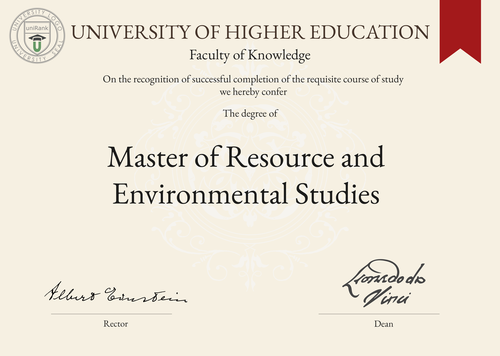
Master of Resource and Environmental Studies (MRES)
Guide to Master of Resource and Environmental Studies Program/Course/Degree
Master of Resource and Environmental Studies (MRES)

Program Name:
Master of Resource and Environmental StudiesProgram or Degree abbreviation:
MRESDuration range:
Varies by country and university, typically 1-2 yearsTuition range:
Varies by country and university, typically $10,000-$30,000 per yearOverview:
The Master of Resource and Environmental Studies program is designed to provide students with a comprehensive understanding of the complex issues surrounding natural resource management and environmental sustainability. Students will gain knowledge and skills in areas such as environmental policy, conservation, renewable energy and sustainable development.Curriculum Overview by year:
The curriculum is structured to cover both theoretical and practical aspects of resource and environmental studies. In the first year, students will take core courses that provide a foundation in key concepts and theories. In the second year, students can choose from a range of elective courses to specialize in their area of interest. Additionally, students may have the opportunity to participate in fieldwork or research projects.Key Components:
The key components of the program include coursework in environmental policy, natural resource management, sustainability, research methods and data analysis. Students may also have the opportunity to gain practical experience through internships or research projects.Career Prospects:
Graduates of the Master of Resource and Environmental Studies program can pursue a variety of career paths in both the public and private sectors. Potential career options include environmental consulting, policy analysis, resource management, sustainability planning and research.Salary Expectations:
Salary expectations for graduates of the program can vary depending on factors such as location, industry and level of experience. Generally, professionals in the field of resource and environmental studies can earn competitive salaries, with the potential for growth and advancement.Conclusions:
It is important to note that the duration, tuition fees, curriculum, key components, career prospects and salary expectations of the Master of Resource and Environmental Studies program can vary depending on the country or location where the program is studied, as well as the specific university offering the program. Prospective students are encouraged to research and compare different options to find the program that best fits their needs and goals. Visitors can search for where this specific degree, the Master of Resource and Environmental Studies, is offered anywhere in the world through the uniRank World Universities Search Engine.World Universities Search Engine
search for Master of Resource and Environmental Studies (MRES) and add the Location (country, state etc.) or specific University you are interested in studying at.
Query examples:
- Master of Resource and Environmental Studies (MRES) United States
- Master of Resource and Environmental Studies (MRES) United Kingdom online
- Master of Resource and Environmental Studies (MRES) Australia international students
- Master of Resource and Environmental Studies (MRES) University of California
- Master of Resource and Environmental Studies (MRES) University of London tuition fees
- Master of Resource and Environmental Studies (MRES) University of Sydney scholarships
Share Program/Course
Interesting? Share this program/course/degree info with your friends now.